How To Get Rid Of Phlegm Naturally: 17 Home Remedies
Clear your clogged airways with natural ingredients like ginger, herbal tea, and more.

Image: ShutterStock
If you have been dealing with a wet cough for quite some time, it is important to get rid of the phlegm. Phlegm and mucus generally hint at an underlying infection, and you should not let it build up. While most cough medicines and over-the-counter and natural expectorants, like licorice root, slippery elm bark, nettle leaf, cinnamon, and oregano essential oil, help you get that phlegm out of your system, certain home remedies can help ease up the mucus making it easier to get rid of the phlegm. Read on to know more about phlegm, its different color indications, and how to help ease your airways by getting rid of phlegm altogether.

In This Article
What Is Phlegm?
Phlegm is a thick and sticky fluid that is secreted in your chest. Although this secretion is the result of a natural process, in some cases, it may be the result of an underlying disease. When you are running a cold or flu and cough phlegm up, it is termed as sputum. Your body doesn???t usually produce too much phlegm unless you are sick.
Now that you know phlegm, scroll down to the next section for the major causes of phlegm.
Key Takeaways
- The thick, sticky fluid known as phlegm is naturally produced by the chest.
- Oil pulling, salt water gargling, and vaporizers are other popular ways to treat phlegm
- To determine if your phlegm is a sign of any disease, look at its color.
- Garlic, ginger, lemon juice, and honey, may be used to treat these infections as they have antiviral and antibacterial properties.
What Causes Phlegm?
Here is a list of factors that cause phlegm (1), (2), (3), (4), (5):
- Respiratory Infections: Viral and bacterial infections like the common cold, pharyngitis, and flu can increase mucus production, leading to phlegm.
- Allergies: Exposure to pollen, dust, or pet dander can trigger an allergic reaction, prompting the body to produce more mucus.
- Smoking: Smoking is a well-known irritant to the respiratory tract, resulting in inflammation and heightened mucus production.
- Environmental Irritants: Inhaling pollutants, chemicals, or irritants like air pollution can stimulate phlegm production.
- Postnasal Drip: Mucus from the nasal passages can drip down the throat, causing increased phlegm.
- Gastroesophageal Reflux Disease (GERD): Stomach acid entering the throat can lead to irritation and the presence of phlegm.
- Asthma: Airway inflammation can lead to excess mucus production.
The best way to find whether your phlegm is an indication of any disease is to look for its color. Given below is a phlegm color chart that can help you.
What Does The Colour Of Your Phlegm Say About Your Health?
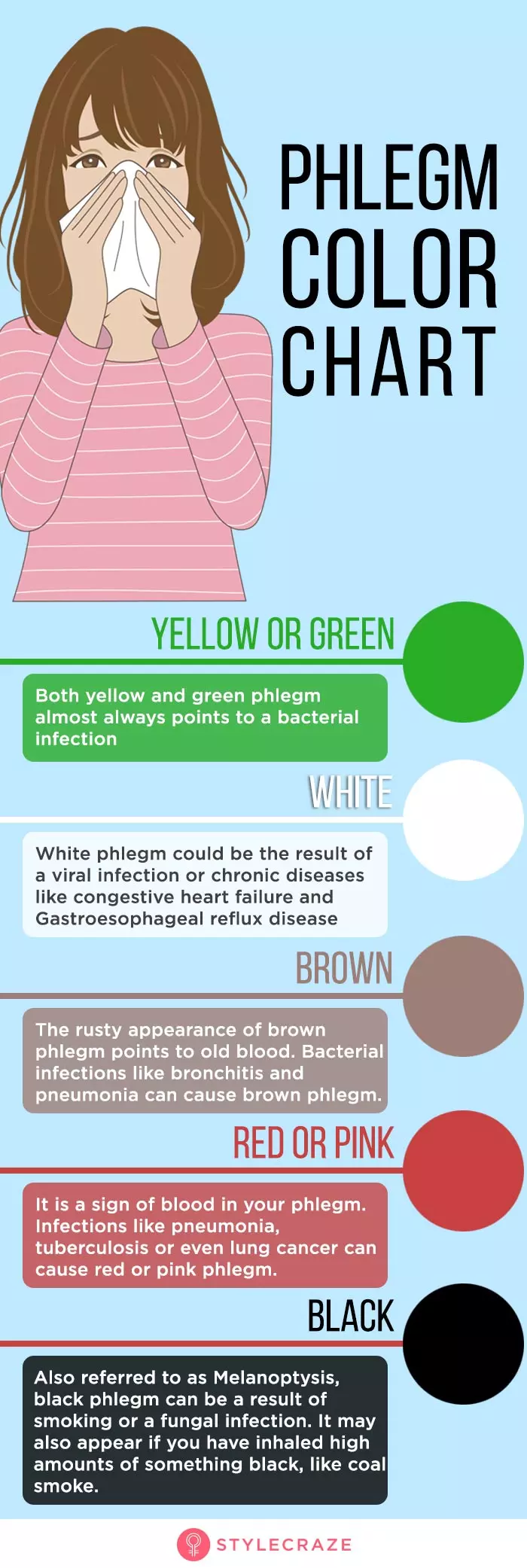
- Green Or Yellow Phlegm
Green or yellow phlegm is usually an indication that your body is fighting a disease. Medical conditions like bronchitis, pneumonia, sinusitisi A condition caused by the swelling of tissues lining the sinuses (cavities around the nasal passages). , and cystic fibrosisi A rare inherited disorder that damages the lungs, digestive system, and other organs through the buildup of sticky mucus. may result in green or yellow phlegm. But you must also look for other symptoms to identify which one of these you are actually suffering from.
- White Phlegm
The most common conditions that lead to the formation of white phlegm include viral bronchitis, gastroesophageal reflux diseasei A digestive disease in which stomach acid repeatedly moves up into the esophagus and irritates its lining. , and congestive heart failure.
- Brown Phlegm
Brown phlegm is usually rusty and most often hints at old blood. It is usually caused by bacterial pneumonia and bacterial bronchitis.
- Red Or Pink Phlegm
The main cause of pink or red phlegm is blood. Infections like pneumonia, tuberculosis, congestive heart failure, pulmonary embolismi A condition that occurs when lung arteries are blocked by a blood clot, stopping the flow of blood to that part of the lungs. , and even lung cancer may be the underlying cause of pink or red sputum.
- Black Phlegm
Melanoptysis is another term used for black sputum. Black sputum is usually a sign that you have inhaled high amounts of something black, say coal dust or kohl. It is commonly caused by smoking, pneumoconiosisi A lung disease caused by breathing in certain dust particles that could damage your lung, usually due to exposure at work. or a fungal infection caused by a black yeast called Exophiala dermatitidis.
Excessive phlegm is usually the result of an allergy or infection. It can also be caused by certain foods like milk and other dairy products, chemotherapy, pregnancy, or even candida infections.
Note: Always seek advice from a qualified physician before beginning a new treatment or if your mucus or phlegm problems worsen, persist, or are accompanied by other concerning symptoms.
The symptoms that surface with the build-up of phlegm usually vary depending on its cause. However, some common signs and symptoms of phlegm associated with excessive fluid build-up are mentioned below.
Signs And Symptoms Of Phlegm
The most common signs and symptoms of an excessive phlegm build-up include the following:
- Coughing up mucus and phlegm
- A runny nose
- Nasal or chest congestion
- A sinus headache
- A sore and congested throat
- Shortness of breath
 Quick Tip
Quick TipMost cases of phlegm build-up are a result of infections like a cold or flu and can be cured easily. If you have been suffering from phlegm following a disease and wish to get rid of it soon, the following remedies are just for you.
How To Get Rid Of Phlegm Naturally
- Apple Cider Vinegar
- Essential Oils
- Salt Water Gargle
- Ginger
- Garlic
- Turmeric And Apple Cider Vinegar
- Humidifier/Vaporizer
- Honey
- Onion
- Lemon Juice
- Herbal Teas
- Cayenne Pepper
- Jaggery
- Pineapple Juice
- Oil Pulling
- Orange Juice
- Soups
Home Remedies To Treat Phlegm (Mucus)
Excessive phlegm can interfere with your respiratory functions, interfering with everyday life, so it is ideal to address it early. Here are a few home remedies for chest congestion that can speed up your healing process.
1. Apple Cider Vinegar
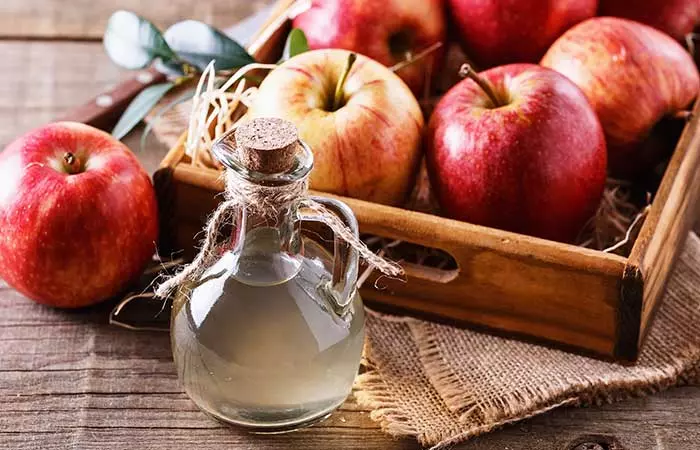
You Will Need
- 1 tablespoon of apple cider vinegar
- 1 glass of water
- Honey (optional)
What You Have To Do
- Add a tablespoon of apple cider vinegar to a glass of water and mix well.
- Consume this solution on a daily basis.
- You can also add honey to this for flavor.
How Often You Should Do This
You must do this at least thrice daily.
Why This Works
Apple cider vinegar is often used as a natural decongestant. This is due to its potassium content, which is known to help with runny noses. ACV also has natural antiviral and antibacterial properties that can help in fighting infections that result in excessive phlegm production (6).
Note: Avoid apple cider vinegar if you have a sensitive throat or mouth sores because the acidity of undiluted ACV may irritate the throat lining.
2. Essential Oils
1. Peppermint Oil
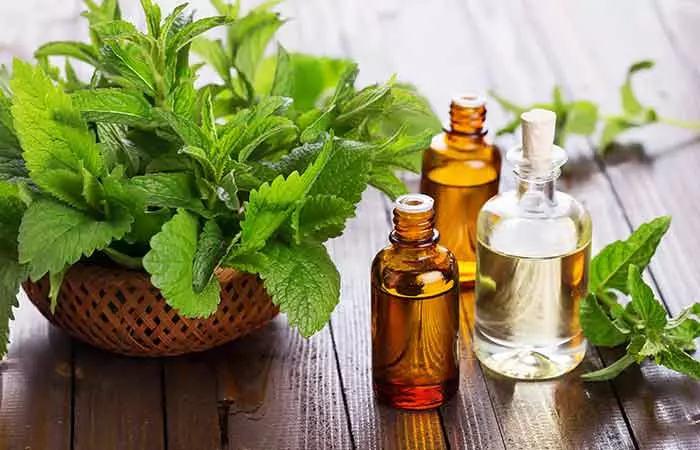
You Will Need
- 7-8 drops of peppermint oil
- 1 bowl of steaming hot water
What You Have To Do
- Add a few drops of peppermint oil to a bowl of steaming hot water.
- Bend over the bowl and cover your head with a towel or blanket.
- Inhale the steam deeply.
How Often You Should Do This
You can do this 1 to 2 times daily.
Why This Works
Peppermint oil is one of the most widely used essential oils to clear congestion. One of the main components of peppermint oil is menthol, which is a natural expectoranti A cough medicine to lubricate the airway and remove phlegm from the passageway to relieve congestion. and has antispasmodic properties (7). The vapors from peppermint oil can go right up to your lungs and help in breaking down the phlegm build-up and relaxing your lung muscles. Peppermint oil is also antibacterial and can help fight infections that lead to excessive phlegm accumulation in your body (8).
2. Eucalyptus Oil
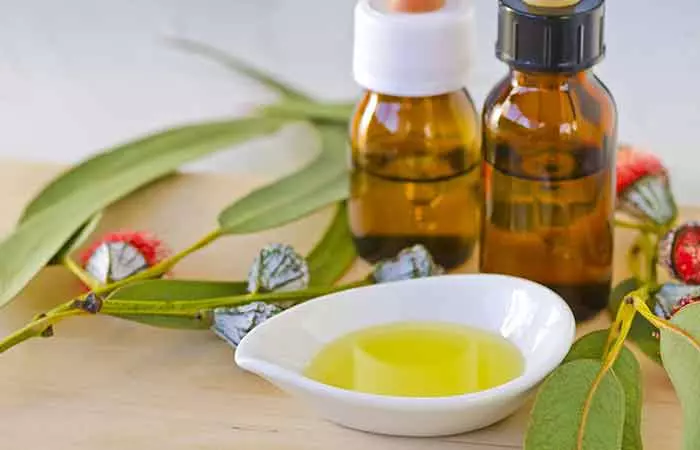
You Will Need
- 6-8 drops of eucalyptus oil
- A bowl of steaming hot water
What You Have To Do
- ??Add a few drops of eucalyptus oil to a bowl of steaming water.
- ??Cover your head with a towel and inhale the decongesting vapors.
How Often You Should Do This
You must do this 1 to 2 times daily.
Why This Works
Eucalyptus oil contains eucalyptoli A colorless liquid with a spicy and mint-like smell that is used as an ingredient in many mouthwash and cough medicines. that makes it a potent decongestant and microbe-fighting agent. The decongesting properties of eucalyptus oil help in breaking up the phlegm, and its antimicrobial properties can combat infections (9), (10).
3. Salt Water Gargle
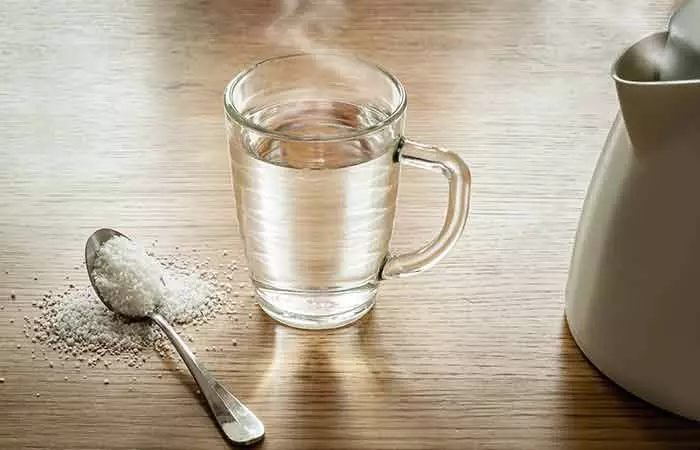
You Will Need
- 1 teaspoon of salt
- 1 glass of hot water
What You Have To Do
- Add a teaspoon of salt to a glass of medium hot water.
- Mix well and use this solution to gargle.
How Often You Should Do This
You must do this at least thrice daily.
Why This Works
Salt water gargle is a proven remedy to combat upper respiratory infections like cold and flu, both of which can lead to phlegm build-up (11). While the hot water can provide immediate relief to your congested throat, the antibacterial properties of salt can combat the infections that have resulted in the excessive production of phlegm (12).
4. Ginger
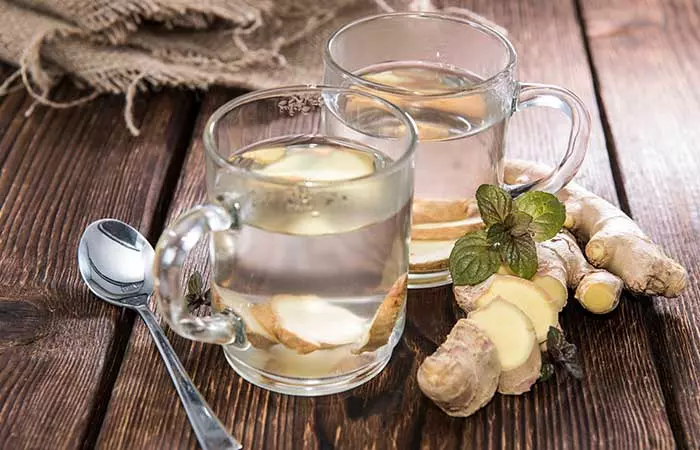
You Will Need
- 1 to 2 inches of ginger
- 1 cup of hot water
- Honey (optional)
What You Have To Do
- Steep the ginger in hot water for 5 to 10 minutes.
- Strain and let it cool a bit.
- Add a little honey to the slightly warm ginger tea and consume it.
How Often You Should Do This
You must drink this tea 3 to 4 times daily.
Why This Works
Ginger is rich in various polyphenols and flavonoids that are antibacterial, antiviral, and antispasmodic (13), (14), (15). These can help fight infections and prevent congestion due to excessive production of phlegm. Regular intake of ginger will also have a relaxing effect on your lung muscles and help in decongestion. In addition to this, ginger is quite popular for its use as a natural expectorant and can help relieve the symptoms of excessive phlegm or mucus build-up.
Note: Avoid taking high dosages of ginger without supervision. Long-term or excessive use can cause toxicity even if they are natural compounds.
5. Garlic
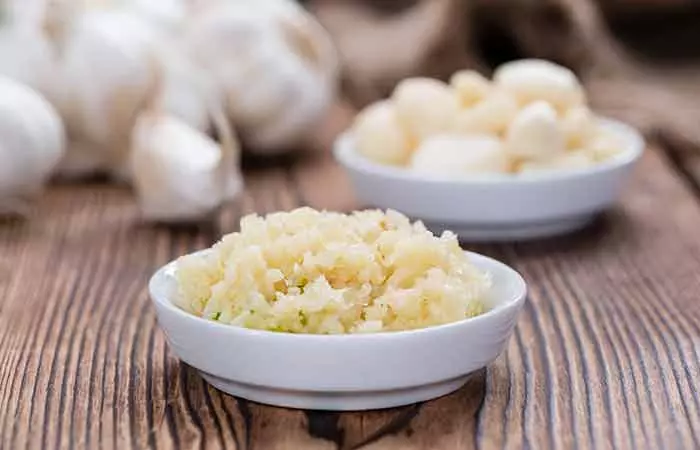
You Will Need
- 4-5 cloves of garlic
- 1 cup of warm water
What You Have To Do
- Crush a few cloves of garlic and consume with warm water every morning.
- Alternatively, you can also chew on the garlic cloves or add them to your daily diet.
How Often You Should Do This
Do this 3 to 4 times daily.
Why This Works
Garlic contains a compound called allicin that gives it most of its medicinal properties. In addition to being used as a natural expectorant to help break down the phlegm build-up, garlic also possesses antimicrobial properties that can help fight bacterial, viral, and fungal infections that may cause your respiratory glands to produce more phlegm (16), (17).
6. Turmeric
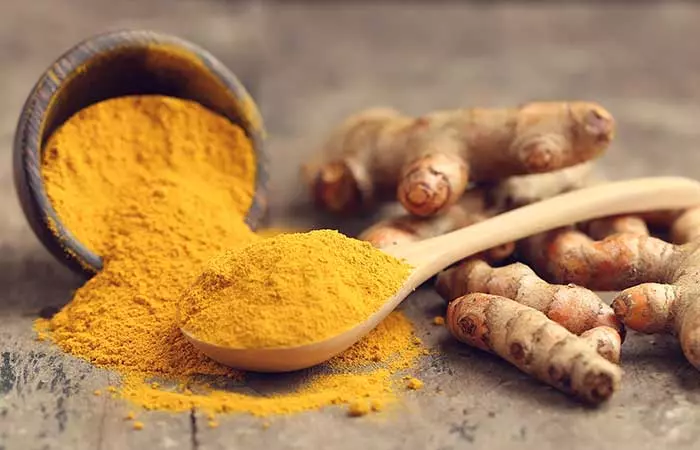
You Will Need
- 1 teaspoon of turmeric
- 1 tablespoon of apple cider vinegar
- 1 teaspoon of honey
- 1 glass of warm water
What You Have To Do
- Add about a tablespoon of apple cider vinegar and a teaspoon of turmeric to a glass of warm water.
- Stir well and add a little honey for flavor.
- Consume this solution on a daily basis.
- Alternatively, you can also gargle with this solution multiple times a day.
How Often You Should Do This
You must do this at least 2 to 3 times daily.
You could also try turmeric tea.
Turmeric Tea
You Will Need
- 1 teaspoon of turmeric powder
- 1 cup of boiling water
- Honey (optional)
What You Have To Do
- Add turmeric powder to boiling water and let it steep for 10 minutes.
- Strain and add honey to taste, if desired.
How Often You Should Do This
Drink this tea 2-3 times daily.
Why This Works
The presence of curcumin is what gives turmeric most of its wonderful healing properties (18). Curcumin is a natural antiseptic and exhibits antimicrobial properties against various fungi, bacteria, and viruses (19). It also decongests congested or obstructed airways by helping to loosen the phlegm accumulation in your chest and throat (20).
7. Humidifier/Vaporizer
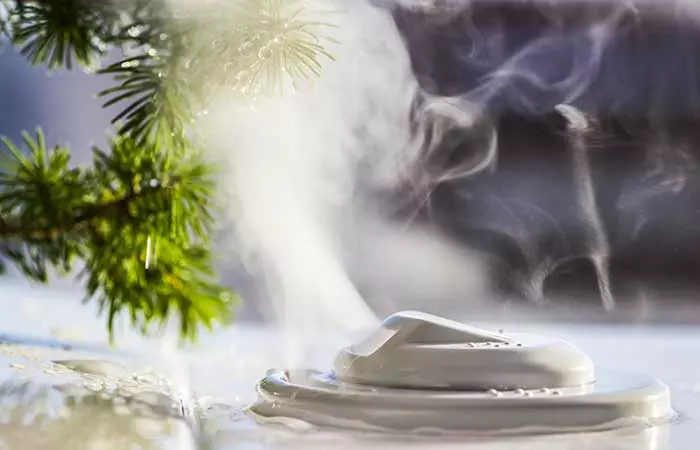
Exposing yourself to cold and dry air can worsen the phlegm build-up. Therefore, it is recommended that you use a humidifier or vaporizer in your room to keep the surrounding air moist and prevent dehydration.
Moist air helps in loosening the mucus, making it easier to pass through your nasal passages and airways. This also helps combat infections like sore throat and cough, which may be an underlying cause of the excessive phlegm produced by your body.
You can also add a few drops of any essential oils to the humidifier for maximum benefits. However, you must remember to clean the humidifier once in a while to prevent indoor pollution (21).
8. Honey
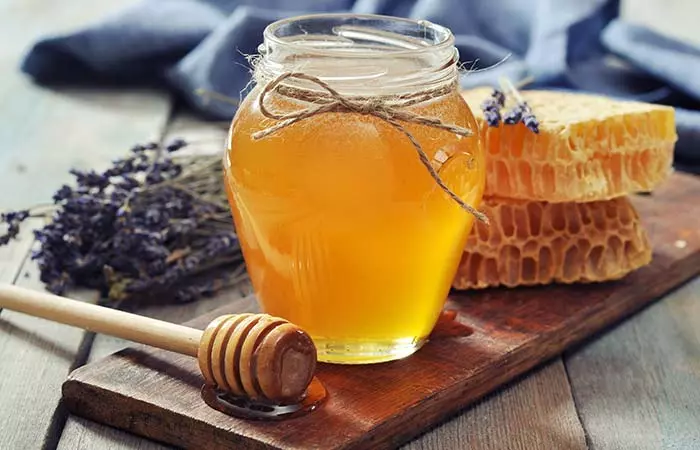
You Will Need
- 1 tablespoon of honey
- A pinch of pepper powder
What You Have To Do
- Mix the honey and pepper powder and consume this mixture daily.
- Alternatively, you can also add a tablespoon of honey to a glass of slightly warm water and consume it on a daily basis.
How Often You Should Do This
You must do this 2 to 3 times daily.
Why This Works
Honey is another natural remedy that can help reduce excessive phlegm build-up. Studies have proved honey to be effective in treating upper respiratory diseases like cough in children, proving its decongestant and expectorant properties that can be quite effective against phlegm and mucus accumulation (22), (23), (24).
9. Onion
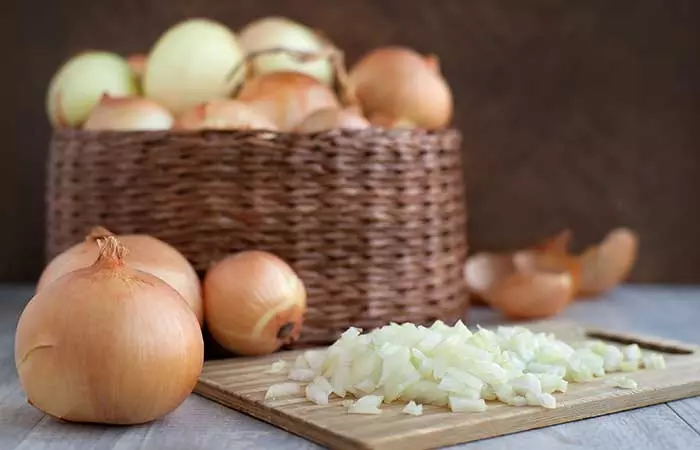
You Will Need
- 1 tablespoon of crushed onion
- 1/2 tablespoon of honey
What You Have To Do
- Take an onion and cut it into small pieces.
- Crush a tablespoon of the cut onions and mix with half a tablespoon of honey.
- Consume this onion-honey mixture.
How Often You Should Do This
You must consume this mixture at least 2 to 3 times daily.
Why This Works
Onions are a rich source of various nutrients, but it is the presence of a compound called quercetin that makes them quite popular. Quercetin has proved to be beneficial against various diseases. However, it is its action against allergies and respiratory infections that highlights its usefulness. Quercetin is an anti-allergic agent and can help prevent the accumulation of phlegm and mucus in your respiratory tracts (25), (26). It is also known for its immunity boosting properties and can hence be used to promote your overall health as well (27).
10. Lemon Juice
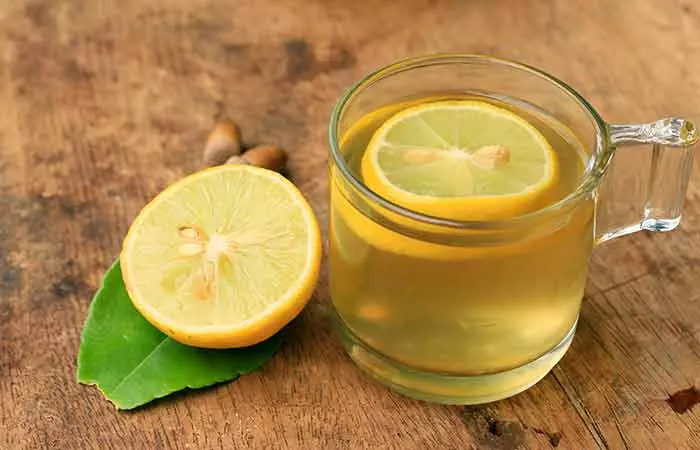
You Will Need
- 1/2 lemon
- 1 glass of warm water
- Honey
What You Have To Do
- Add the juice of half a lemon to a glass of warm water.
- Add honey to the lemon flavored water and consume daily.
- Alternatively, sprinkle a little salt and pepper on half a lemon and suck on it.
How Often You Should Do This
You must do this at least thrice daily.
Why This Works
This is one of the most effective remedies to get rid of phlegm. Lemons are a rich source of vitamin C (28). Vitamin C is proven to be effective in treating infections like whooping cough and cold, both of which are often accompanied by the excessive production of phlegm. Other than this, lemons are also bactericidal and can help fight bacterial infections that cause your body to produce phlegm in excess (29).
Note: Dilute lemon juice in warm water or herbal tea to reduce its acidity. Also, rinse your mouth with plain water after drinking lemon juice to protect tooth enamel.
11. Herbal Teas
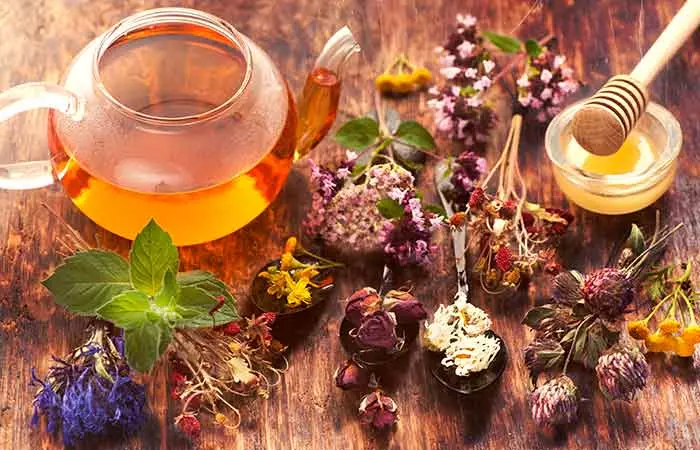
The intake of any hot fluid provides hydration and helps in getting rid of excessive phlegm, and when the hot fluid is a herbal concoction (like an ayurvedic remedy), results are exceptional. Green tea, chamomile tea, thyme, and peppermint tea provide immediate relief from the phlegm build-up in your throat and chest. While the herbs combat microbial infections that may be a major cause of phlegm accumulation, the hot water can soothe your inflamed glands, thereby reducing the unwanted mucus or phlegm secretion (30), (31), (32), (33).
12. Cayenne Pepper
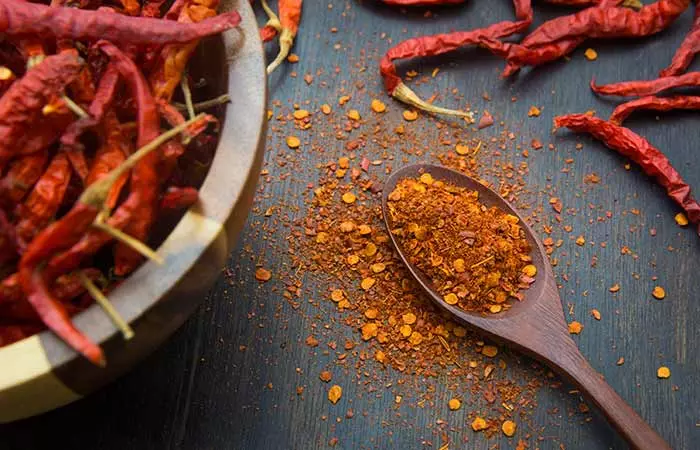
You Will Need
- 1/4 teaspoon of cayenne pepper powder
- 1 tablespoon of honey
- 2 tablespoons of water
What You Have To Do
- Mix cayenne pepper powder with water and add honey to this.
- Consume this solution on a daily basis.
How Often You Should Do This
You must drink this mixture at least twice daily.
Why This Works
One of the easiest ways to get rid of the unwanted phlegm is to indulge in spicy foods and hot fluids. Given its spicy flavor, cayenne pepper provides immediate relief from the congestion caused by phlegm build-up. It is also quite popular for its antibacterial and anti-inflammatory properties, which help combat infections and inflammation (34), (35).
13. Jaggery
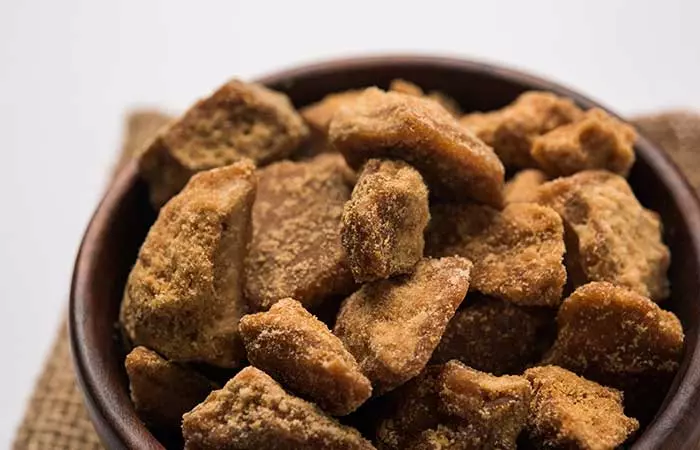
You Will Need
- A piece of jaggery
- 1/2 onion
What You Have To Do
- Cut half an onion into small pieces.
- Mix with crushed jaggery and chew on the pieces.
How Often You Should Do This
You must do this 2 to 3 times daily.
Why This Works
Jaggery is proved to expel unwanted particles from your lungs, thereby making it easier for you to breathe. It can be used to get rid of unwanted phlegm and sputum from your respiratory tracts due to its anti-allergic activities (36).
14. Pineapples
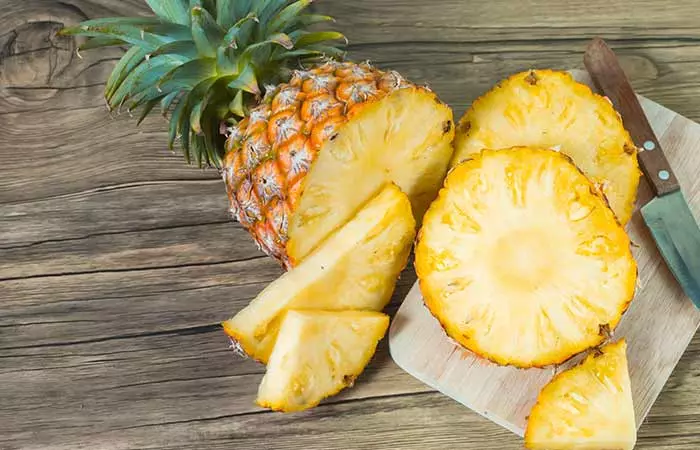
You Will Need
- 1/4 pineapple
- 1 cup of water
What You Have To Do
- Blend one-fourth of a pineapple with a cup of water.
- Consume this juice daily.
- Alternatively, you can also chew on pineapple pieces.
How Often You Should Do This
Drink this juice at least once daily.
Why This Works
Pineapples are packed with vitamins A and C. As we already know, vitamin C can relieve symptoms of cold and cough, which, in turn, helps clear congestion caused by the excessive production of phlegm. Additionally, pineapples are also a rich source of an enzyme called bromelain that possesses anti-inflammatory properties and can help reduce inflammation that causes your glands to produce unwanted mucus (37), (38).
15. Oil Pulling
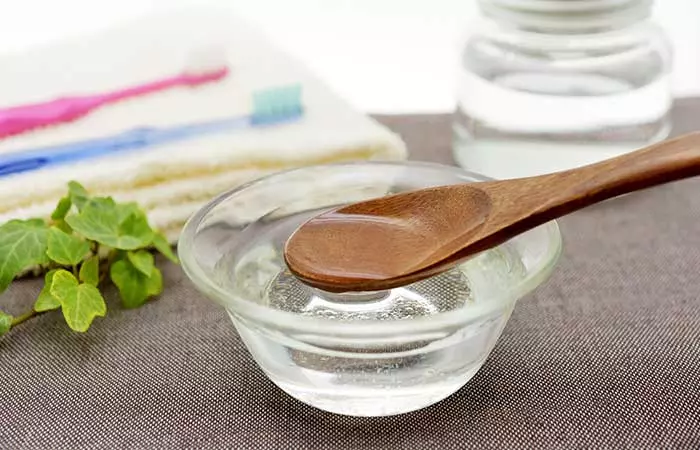
You Will Need
1 tablespoon of coconut oil or sesame oil
What You Have To Do
Take a tablespoon of coconut or sesame oil and swish it in your mouth for 10-15 minutes.
How Often You Should Do This
Do this every morning on an empty stomach.
Why This Works
Oil pulling is a popular practice that is known to improve oral health (39). Swishing the oil in your mouth brings up all the toxins, microbes, and excess phlegm, and this gives you relief from several ailments over time.
Note: People who are allergic to nuts or seed oils such as sesame or coconut shouldn’t use them for pulling.
16. Orange Juice
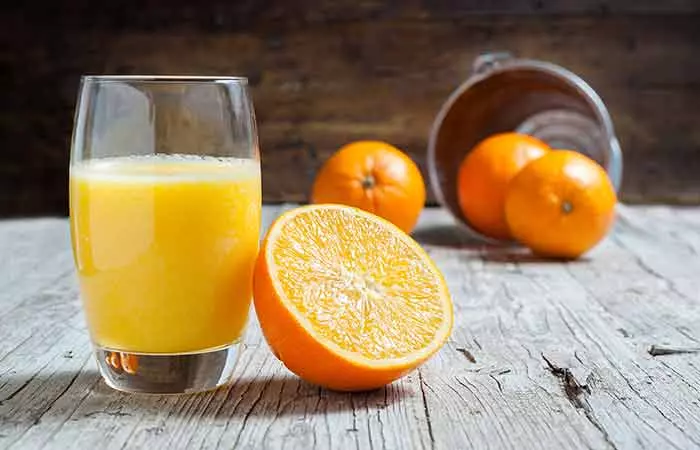
You Will Need
- 1 or 2 oranges
- 1 cup of water
What You Have To Do
- Blend the orange(s) with a cup of water.
- Drink the juice.
How Often You Should Do This
Drink orange juice at least once daily.
Why This Works
Orange juice is packed with vitamin C, a sure shot way to fight infections that cause cold and cough and prevent the accumulation of phlegm in your body (40), (41).
17. Soups
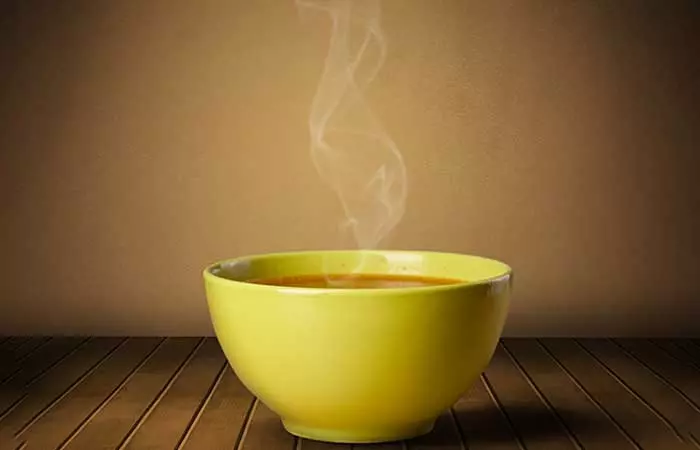
Consuming hot soups multiple times a day is another effective way to thin the mucus and phlegm build-up. Chicken soup and soups containing herbs like ginger and garlic are particularly effective in decongesting the accumulated phlegm (42).
 Did You Know?
Did You Know?These remedies are a sure shot solution to get rid of phlegm build-up. Other remedies to clear phlegm include homeopathy medicines, acupressure, marshmallow root, and fenugreek. However, it won???t harm you if you take additional precautions to make sure that you do not have to face this problem anytime soon. You must follow the preventive tips given below to assist in your recovery from phlegm and congestion.
Preventive Tips
- Avoid intake of dairy products, meat, and fried foods, all of which are known to increase mucus production.
- Drink at least 8 glasses of water per day.
- Have hot fluids and consume spicy foods to help loosen your mucus.
- Inhale steam from hot water multiple times a day.
- Blow your nose often to expel phlegm from your body.
- Limit your exposure to irritants like cigarette smoke, paint or chemicals that can cause an allergic reaction and increase the phlegm in your body.
Infographic: 6 Natural Ways To Combat Phlegm
Dealing with stubborn phlegm can be frustrating and uncomfortable. While phlegm, or mucus, protects our respiratory system, an excess of it can cause congestion. Luckily, it can be managed with natural remedies. The infographic below contains a list of ingredients that may help loosen phlegm and clear the airways. Take a look.

Illustration: StyleCraze Design Team
Phlegm, the sticky fluid that is naturally produced by the body as a protective lining of the airways, can sometimes indicate underlying health concerns. When there is excessive phlegm production, you tend to have wet coughs as the coughing mechanism enables the phlegm to be expelled. Home remedies for mucus and phlegm generally facilitate the process of expulsion by loosening up the mucus and also help soothe associated symptoms like sore throat, nasal congestion, headache, and runny nose. Saltwater gargle, apple cider vinegar, ginger, garlic, honey, oil pulling, warm soups, essential oils, and herbal teas have been found to be effective in treating excess phlegm.
Frequently Asked Questions
What happens when I swallow the phlegm?
Swallowing your mucus will do you no harm. The acids in your stomach will digest your mucus (like other proteins) and also neutralize the cellular debris and bacteria in your stomach (if any). It is quite unlikely that the mucus can survive the acids in your stomach.
What is the difference between phlegm and mucus?
Mucus is a thick and sticky fluid that is secreted by the mucous membranes of your nose. When the mucus is secreted from your respiratory tract, it is referred to as phlegm.
How to get rid of mucus build-up in the throat?
You can easily get rid of the mucus build-up in your throat with the regular intake of hot fluids and spicy foods. You can also gargle with salt water and inhale steam.
Can dairy products cause excess mucus?
Although dairy products do not cause lots of phlegm in your throat, they might worsen the congestion by making your phlegm thicker and more irritating to your throat.
When to see a doctor?
While a tickle in the throat is not alarming, if your symptoms last for more than 10 days and are followed by green or yellow-colored phlegm, you might need to consult your doctor as these are the symptoms of a bacterial infection. Also, if you have blood in your nasal discharge or sputum, it is best to see your doctor immediately.
How long does a mucus cough last?
In most cases, a mucus cough can last up to 3 weeks. But the right treatment options may offer relief much earlier.
Where does phlegm come from when you cough?
Phlegm is a form of mucus produced by the cells of the mouth, throat, nose, and the sinuses. It is used by the respiratory system to combat inflammation.
Can you have phlegm without being sick?
Yes, it can happen. Coughing up phlegm without being sick can happen during allergies or heartburn and even when someone smokes.
Does Covid cause excess phlegm?
Yes, lungs and airways can start producing extra phlegm when you contract the Coronavirus.
Say goodbye to persistent phlegm with this effective home remedy! In this video, you’ll learn natural techniques to clear the accumulated phlegm from your lungs, chest, and throat. Check it out now!
References
Articles on StyleCraze are backed by verified information from peer-reviewed and academic research papers, reputed organizations, research institutions, and medical associations to ensure accuracy and relevance. Read our editorial policy to learn more.
- Gastroesophageal reflux disease is a risk factor for sputum production in the general population: the Nagahama study
https://respiratory-research.biomedcentral.com/articles/10.1186/s12931-020-01601-y - Infections of the Respiratory System
https://www.ncbi.nlm.nih.gov/books/NBK8142/ - Mucus hypersecretion in asthma: causes and effects
https://pmc.ncbi.nlm.nih.gov/articles/PMC2709596/ - Laryngeal mucus hypersecretion is exacerbated after smoking cessation and ameliorated by glucocorticoid administration
https://www.sciencedirect.com/science/article/pii/S0378427416333343 - Respiratory Allergies: A General Overview of Remedies Delivery Systems and the Need to Progress
https://pmc.ncbi.nlm.nih.gov/articles/PMC3972928/ - “A Major Quality of Life Issue”: A Survey-Based Analysis of the Experiences of Adults With Laryngotracheal Stenosis with Mucus and Cough
https://pmc.ncbi.nlm.nih.gov/articles/PMC9340141/ - Antispasmodic effect of Mentha piperita essential oil on tracheal smooth muscle of rats
https://pubmed.ncbi.nlm.nih.gov/20488237/ - Antibacterial and antifungal activity of ten essential oils in vitro
https://pubmed.ncbi.nlm.nih.gov/8893526/ - Antibacterial activity of the essential oils from the leaves of Eucalyptus globulus against Escherichia coli and Staphylococcus aureus
https://pmc.ncbi.nlm.nih.gov/articles/PMC3609378/ - Treatment of Upper Respiratory Tract Infections in Primary Care: A Randomized Study Using Aromatic Herbs
https://pmc.ncbi.nlm.nih.gov/articles/PMC2967840/ - Prevention of upper respiratory tract infections by gargling: a randomized trial
https://pubmed.ncbi.nlm.nih.gov/16242593/ - Antimicrobial properties of salt (NaCl) used for the preservation of natural casings
https://pubmed.ncbi.nlm.nih.gov/16943065/ - The Amazing and Mighty Ginger
https://www.ncbi.nlm.nih.gov/books/NBK92775/ - Fresh ginger (Zingiber officinale) has anti-viral activity against human respiratory syncytial virus in human respiratory tract cell lines
https://pubmed.ncbi.nlm.nih.gov/23123794/ - Antibacterial activity of [10]-gingerol and [12]-gingerol isolated from ginger rhizome against periodontal bacteria
https://pubmed.ncbi.nlm.nih.gov/18814211/ - Antimicrobial properties of allicin from garlic
https://pubmed.ncbi.nlm.nih.gov/10594976/ - Garlic: a review of potential therapeutic effects
https://pmc.ncbi.nlm.nih.gov/articles/PMC4103721/ - Turmeric the Golden Spice
https://www.ncbi.nlm.nih.gov/books/NBK92752/ - A Review on Antibacterial Antiviral and Antifungal Activity of Curcumin
https://pmc.ncbi.nlm.nih.gov/articles/PMC4022204/ - Evaluation of Efficacy of Curcumin as an Add-on therapy in Patients of Bronchial Asthma
https://pmc.ncbi.nlm.nih.gov/articles/PMC4190737/ - The effect of the humidifier on sore throat and cough after thyroidectomy
https://pmc.ncbi.nlm.nih.gov/articles/PMC3249568/ - Honey for treatment of cough in children
https://pmc.ncbi.nlm.nih.gov/articles/PMC4264806/ - Honey: its medicinal property and antibacterial activity
https://pmc.ncbi.nlm.nih.gov/articles/PMC3609166/ - Effect of honey dextromethorphan
and no treatment on nocturnal cough and sleep quality for coughing children and their parents - Quercetin and Its Anti-Allergic Immune Response
https://pubmed.ncbi.nlm.nih.gov/27187333/ - Quercetin supplementation and upper respiratory tract infection: A randomized community clinical trial
https://pubmed.ncbi.nlm.nih.gov/20478383/ - Quercetin Inflammation and Immunity
https://pmc.ncbi.nlm.nih.gov/articles/PMC4808895/ - Dietary vitamin C intake is inversely related to cough and wheeze in young smokers
https://pubmed.ncbi.nlm.nih.gov/12587963/ - Bactericidal activity of lemon juice and lemon derivatives against Vibrio cholerae
https://pubmed.ncbi.nlm.nih.gov/11041258/ - Effects of Green Tea Catechins and Theanine on Preventing Influenza Infection among Healthcare Workers: A Randomized Controlled Trial
https://pmc.ncbi.nlm.nih.gov/articles/PMC3049752/ - Chamomile (Matricaria chamomilla L.): An overview
https://pmc.ncbi.nlm.nih.gov/articles/PMC3210003/ - A review of the bioactivity and potential health benefits of peppermint tea (Mentha piperita L.)
https://pubmed.ncbi.nlm.nih.gov/16767798/ - The effects of a hot drink on nasal airflow and symptoms of common cold and flu
https://pubmed.ncbi.nlm.nih.gov/19145994/ - Biological Activities of Red Pepper (Capsicum annuum) and Its Pungent Principle apsaicin: A Review
https://pubmed.ncbi.nlm.nih.gov/25675368/ - Antibacterial activity of Capsicum annuum extract and synthetic capsaicinoid derivatives against Streptococcus mutans
https://pubmed.ncbi.nlm.nih.gov/21858615/ - Enhanced translocation of particles from lungs by jaggery.
https://pmc.ncbi.nlm.nih.gov/articles/PMC1567304/ - Bromelain the enzyme complex of pineapple (Ananas comosus) and its clinical application. An update
https://pubmed.ncbi.nlm.nih.gov/3287010/ - Bromelain : an Anti-Inflammatory Agent
https://journals.sagepub.com/doi/abs/10.1177/000331976201301103?journalCode=anga - Oil pulling for maintaining oral hygiene – A review
https://pmc.ncbi.nlm.nih.gov/articles/PMC5198813/ - Ascorbic Acid (Vitamin C) Treatment of Whooping Cough
https://pmc.ncbi.nlm.nih.gov/articles/PMC1562195/ - Effect of orange juice intake on vitamin C concentrations and biomarkers of antioxidant status in humans
https://pubmed.ncbi.nlm.nih.gov/12936929/ - Effects of drinking hot water cold water and chicken soup on nasal mucus velocity and nasal airflow resistance
https://pubmed.ncbi.nlm.nih.gov/359266/ - Prevalence of chronic cough chronic phlegm & associated factors in Mysore Karnataka India
https://pmc.ncbi.nlm.nih.gov/articles/PMC3171924/
Read full bio of Dr. Abby Kramer
Read full bio of Shaheen Naser
Read full bio of Arshiya Syeda
Read full bio of Dipti Sharma






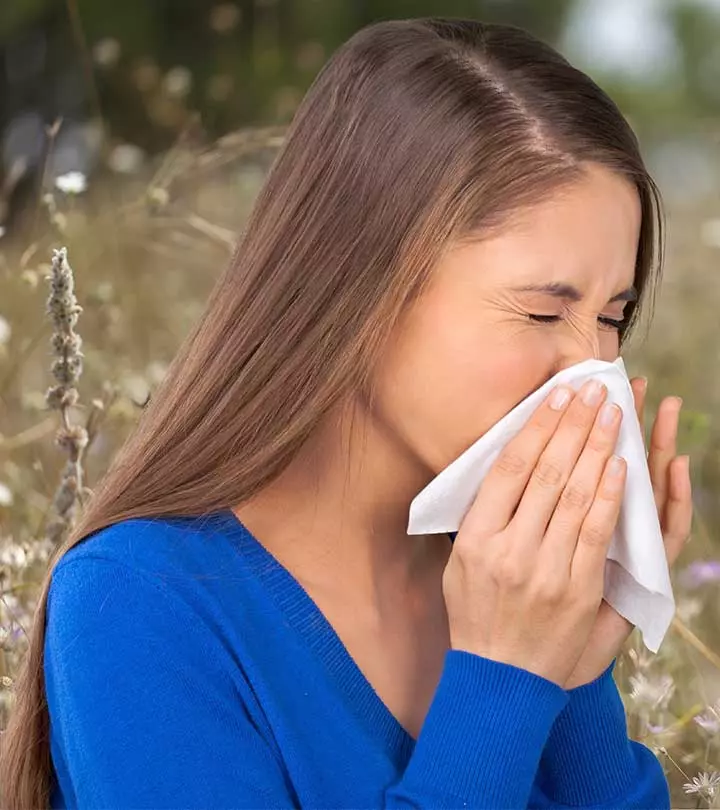
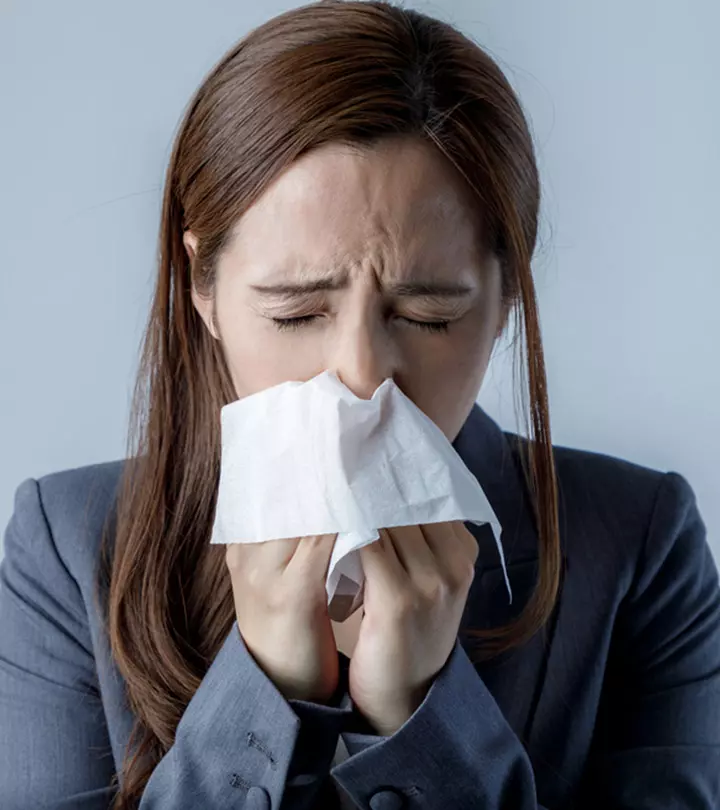
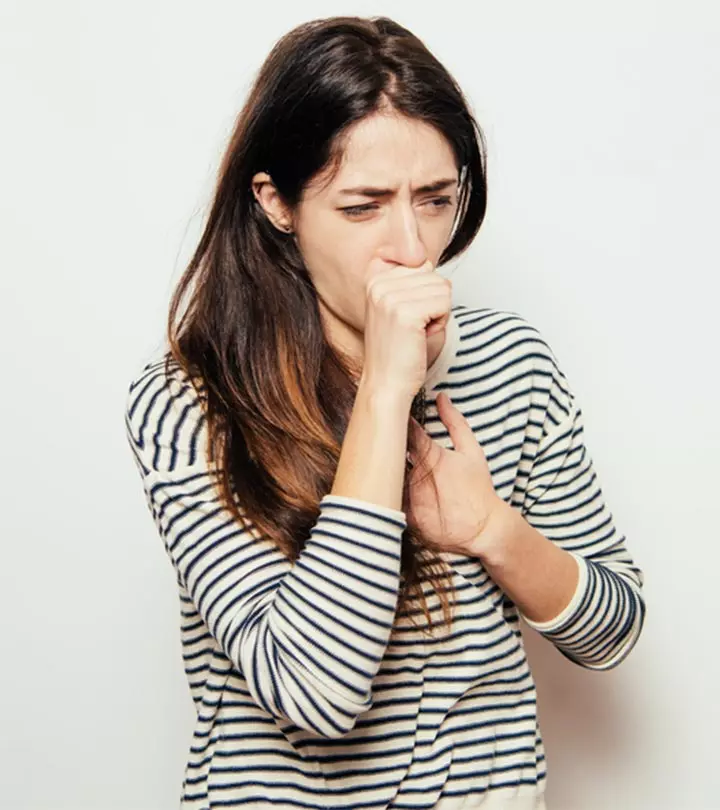
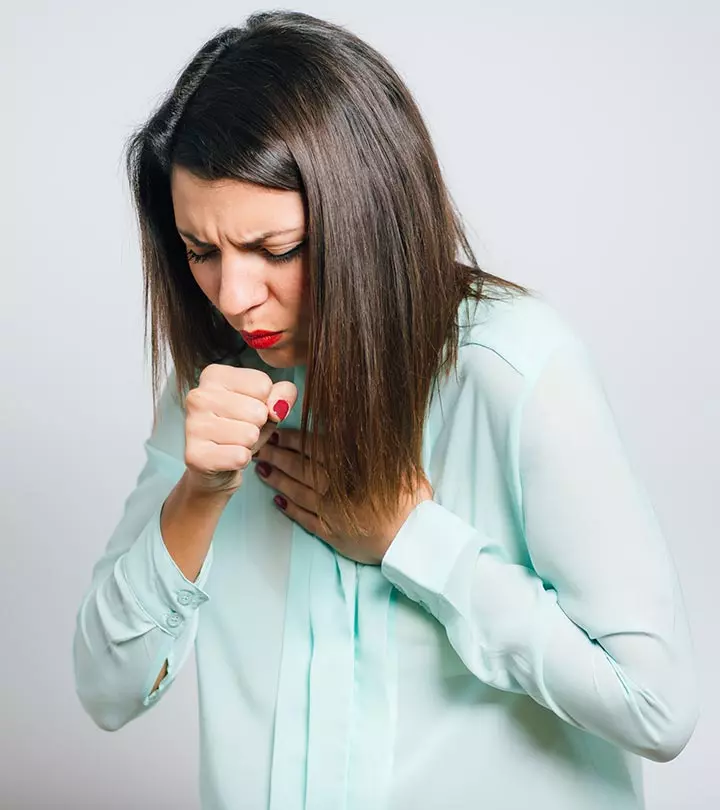

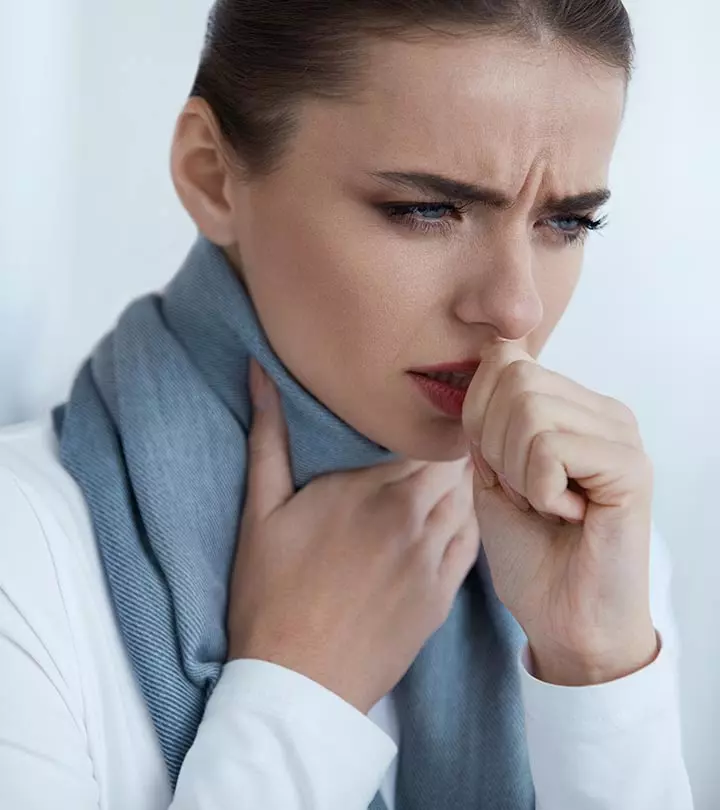
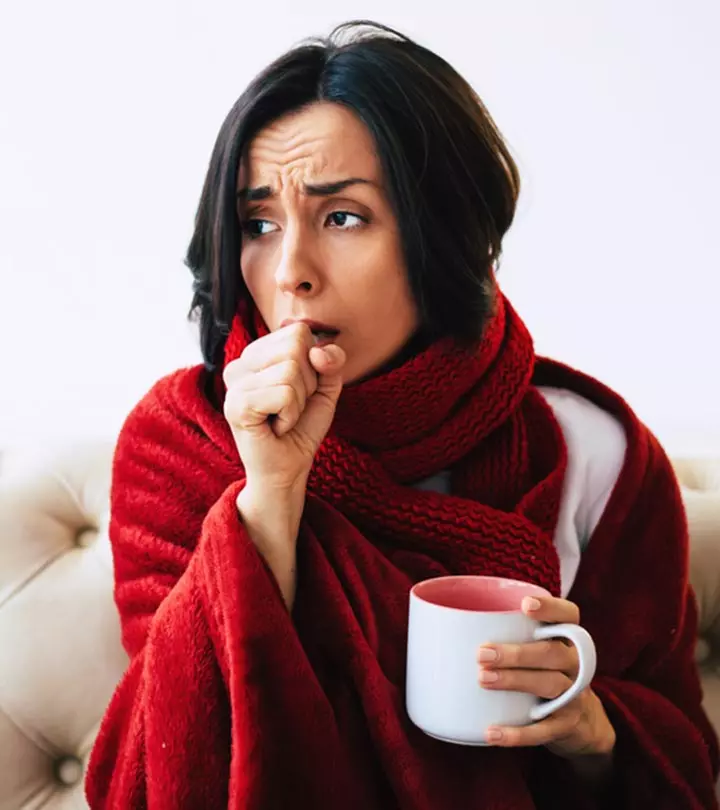
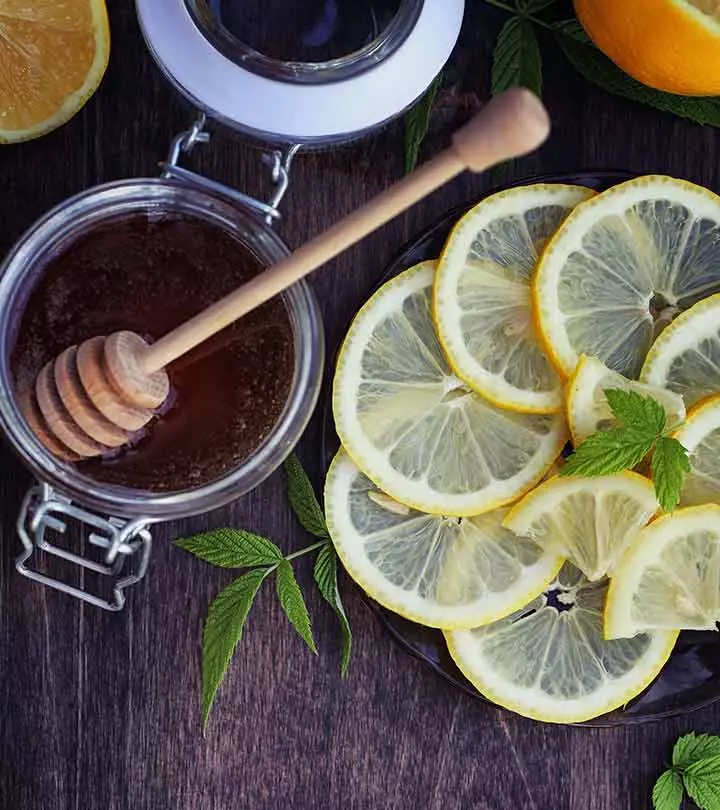
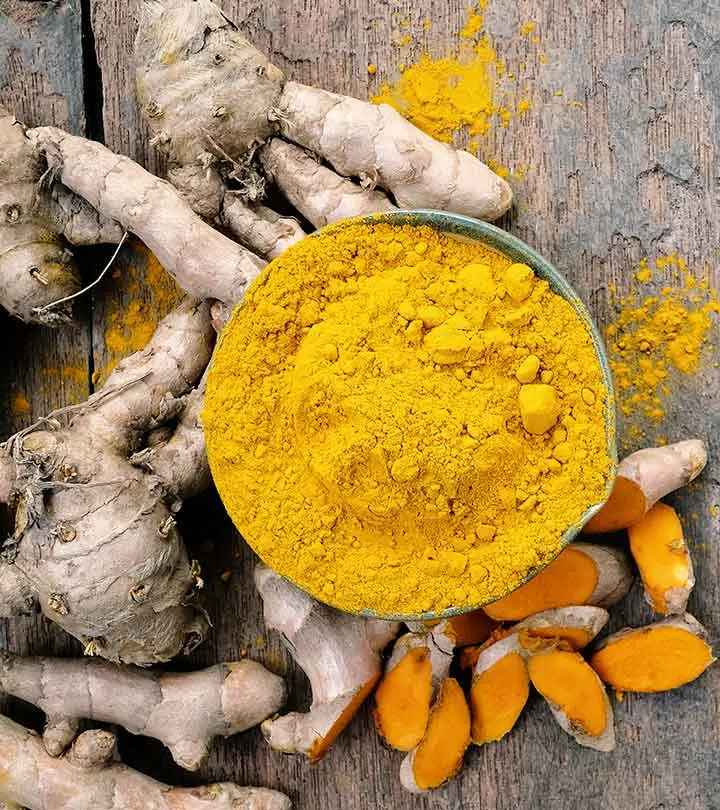
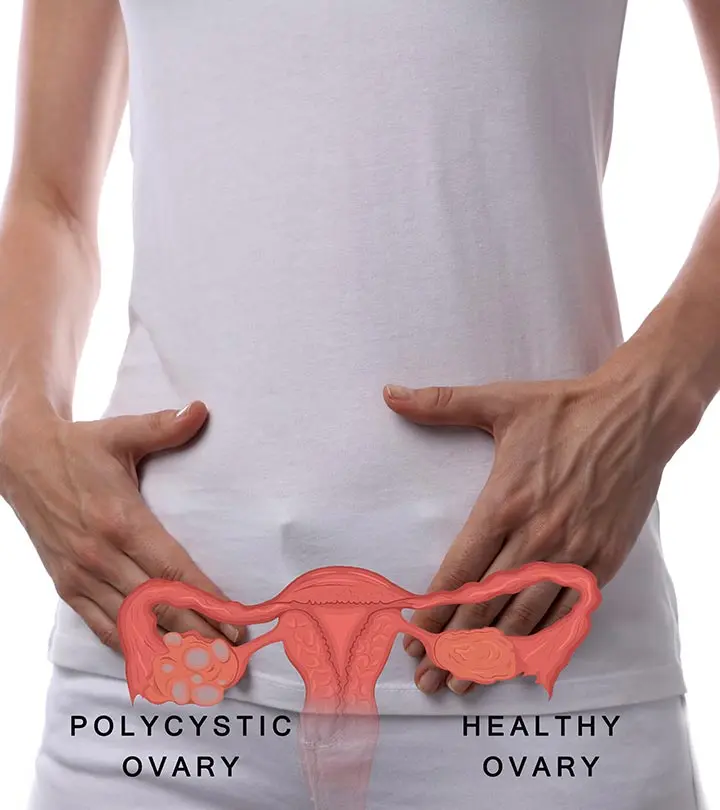









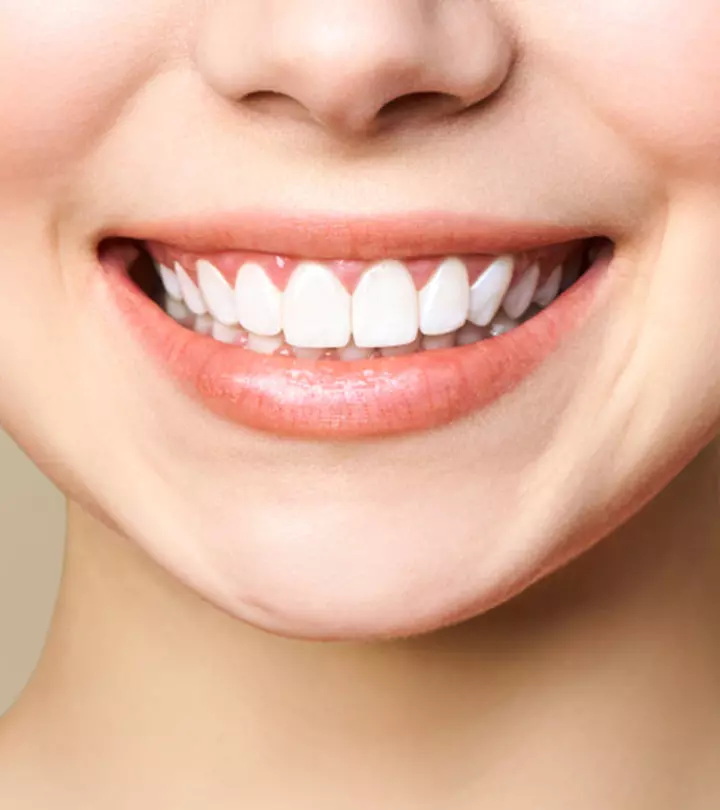

Community Experiences
Join the conversation and become a part of our empowering community! Share your stories, experiences, and insights to connect with other beauty, lifestyle, and health enthusiasts.